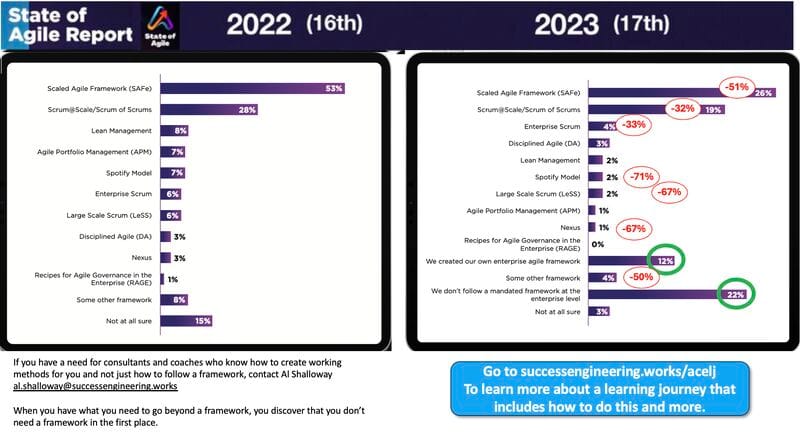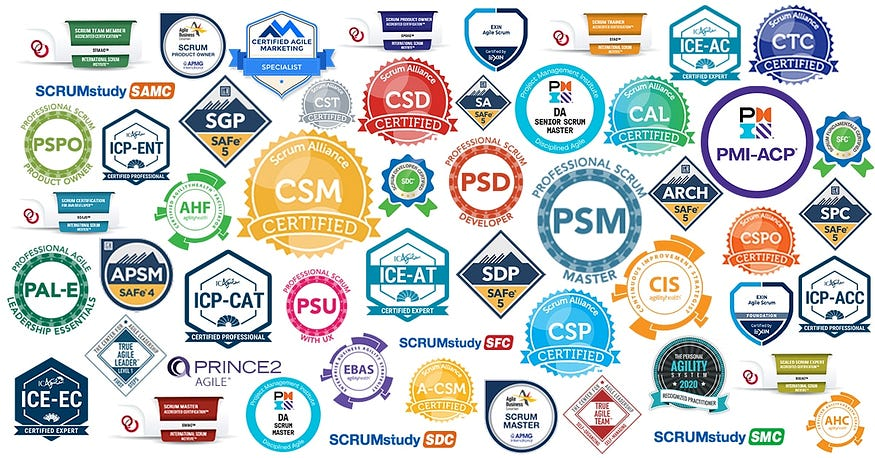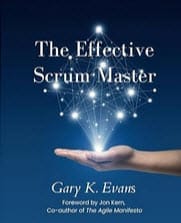Scrum Master Threat Surface
For Scrum Masters the job market has become visibly unfriendly, and all of us must ruthlessly evaluate if our value is greater than the external market threats against our role.

Is Agile dead? This has been a ubiquitous question on LinkedIn since early 2024 and the postings on this topic are still increasing. Some say “yes” and others say Agile is just “evolving”. One conclusion is clear: our software industry is changing dramatically, quickly, and probably irreversibly. Salaries are depressed and Scrum Master jobs are becoming harder to find. Layoffs are the most visible manifestation. An earlier warning came as far back as January 2023 when Capital One in Richmond VA laid off 1,100 positions – mostly Scrum Masters and Coaches. In 2005 Cap One was the largest Scrum shop in the United States.
Pundits offer multiple conjectures on the drivers of these changes. Many blame Agile’s inability to deliver on its promises. I agree, but on every one of my consulting engagements where I joined after a project had more-or-less failed, it was clear the teams – and the management – had not been remotely close to Agile execution. Yet they called themselves ‘agile’, so Agile was indicted.
Artificial Intelligence has a growing cohort of advocates in the demise of Agile. Statements such as “AI will guide teams more effectively and efficiently than any Scrum Master can” try to sound authoritative – but I am totally unconvinced. Agile product teams are human beings with human fears, aspirations, and a deep need for affirmation from other human beings. Computers are wonderful tools, but they are not people.
We don’t know where we get our ideas from. We do
know that we do not get them from our laptops. — John Cleese
However, regardless of what I might personally believe, CIOs and CTOs will certainly experiment to use AI in place of human beings. This embrace of AI is a very real threat to Scrum Masters and Product Owners, but it is reasonable to conclude that the threat is from this exuberant adoption rather than from the less than stellar results AI might produce. (Have you seen some of the drivel ChatGPT produces?) Some of us have been in software development long enough to have endured a half-dozen or more ‘silver bullets’ that were forecast to eliminate the need for developers and others. But we are all still here.
Let’s look at a couple of haunting images that portend what agile teams will be dealing with going forward from today.
Framework Frustration
A significant change is underway with respect to corporations’ allegiance to pre-defined frameworks. The bar graphs in the image below come from the annual State of Agile Reports (https://stateofagile.com). The percentage change annotations were added by Agile thought-leader Alan Shalloway (https://successengineering.works/).

I suspect the diminishing trajectory of these changes will continue in the 2024 State of Agile Report when it is published. This means that anyone who is a “one-trick pony” - knowing only the generic brevity of The Scrum Guide - may find themselves in a career-limiting scenario. Take note of the two areas that did increase year over year. The first is those companies which created their own enterprise framework. This suggests possible frustration that the stars of the Agile framework universe did not yield expected results. The other area of increased allegiance is those companies that “don’t follow a mandated framework.” This category is interesting because it suggests disenchantment with prescribed solutions such as Scrum or SAFe, and that the departments in these corporations are allowed to seek out for themselves what might work for them.
Certification Proliferation
This second image comes from Anthony Mersino in an article titled “An Inventory of Agile and Scrum Certifications” (https://medium.com/leadership-and-agility/an-inventory-of-agile-and-scrum-certifications-4458d146e975).

This is a portion of the 250 Agile certification offerings Mersino compiled in 2020! There are even more now, 5 years later. Is it not sensible to conclude that we have completely jumped the shark regarding all of these (profit driven) certifications? They do not all teach the same ideas about agile product development and delivery. Many are dramatically different from their brethren. It is perfectly reasonable for a CIO to conclude that the purveyors of this morass may have little of value to offer to his or her organization.
And, as a final consideration, I offer a posting from Jem Jelly (https://www.jemjelly.com/), who is a Scrum Master and Agile Coach I find very insightful. His sobering theme in this post is survival:
Scrum Masters who won't survive = "I run Scrum events"
Scrum Masters who WILL survive = (see below)
1. I can help the team improve their ability to deliver software on a regular basis
2. I can help the team slice their work into valuable chunks of work
3. I can help the team map the impact of their work to business outcomes
4. I can help the team improve their cycle time
5. I can help the team get the time to automate repeatable work
6. I can help the team own the solutions to business problems
7. I can help the team become more cross skilled by the time I leave
8. I can help the team use data to convince management to change things which get in our way
9. I can help the team realize that individual tasks have nothing to do with team goals
10. I can help the team feel heard and confident to share their voice
So, in the midst of this confusing time for our job roles, the real question of value for us is: What does all of this mean for me?
You will have your own motivations and goals, but for myself I have embraced three things that I hope all Scrum Masters and Coaches will seriously consider so they will be recognized as craftsmen and craftswomen, not as mere "agile mechanics".
1. Become an Agile Master.
Scrum is just one flavor of how to achieve agility. It is a decent statement of laudable principles, but it says almost nothing about tactics (how to implement the principles). Learning other practices is crucial to be employable in the coming years: Lean principles and wastes, eXtreme programming’s engineering disciplines, Kanban’s Six practices, Tuckman’s stages of Team Evolution, and more. I discuss all of these in detail in my book, The Effective Scrum Master.
2. Observe people intently, including yourself.
AI cannot show empathy or compassion. Similarly, if you are not a people-person you are going to have difficulty being an effective Scrum Master. The Scrum Master role is first a people role, and second a process role. Many Scrum Masters reverse this priority to the detriment of their teams. As a Scrum Master you must also continually interrogate yourself: Why do I avoid confrontation? When should I step in to guide the team, and when should I let a problem simmer for a while? Do not fall into looking for cookie-cutter answers that keep you in your comfort zone. Focus on developing people skills, especially if this makes you uncomfortable.
3. Pursue Your “Why?”
Question what you believe you know is true. Do this not to be cynical, but to see what you do not yet see. We are all prisoners of our ‘stable worlds’. When we ask “Why?” we are accepting a risk of disruption that may change our lives. I will share an example from my very early years as a Scrum Master. I awoke one morning, troubled. I asked myself, “Why did I express myself that way to the team?” I slowly realized I was not willing to delegate. I did not feel I could trust them. “Why do I not trust them? They have not betrayed me.” Then I realized my own fear was killing my team. Everything changed in my career that morning.
My friend, drop all your preconceived and fixed ideas and be neutral.
Do you know why this cup is useful? Because it is empty. — Bruce Lee
In the midst of the changes our industry is experiencing, I have found – for myself – that these three practices eliminated much of the “threat surface” in my career as a Scrum Master and Agile Coach. I offer these for your consideration.
I love working with teams and executives to find effective solutions. Email me at gary@effectivescrummaster.com and let's explore how we might partner on your challenges.





